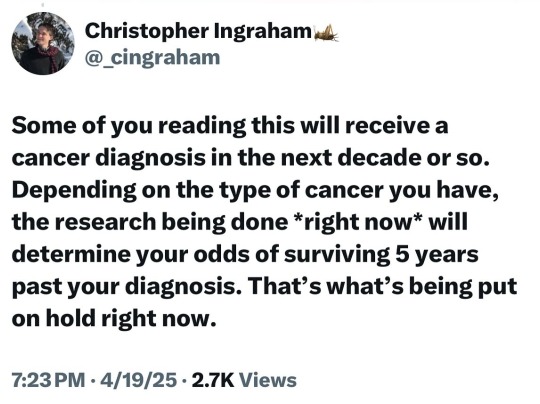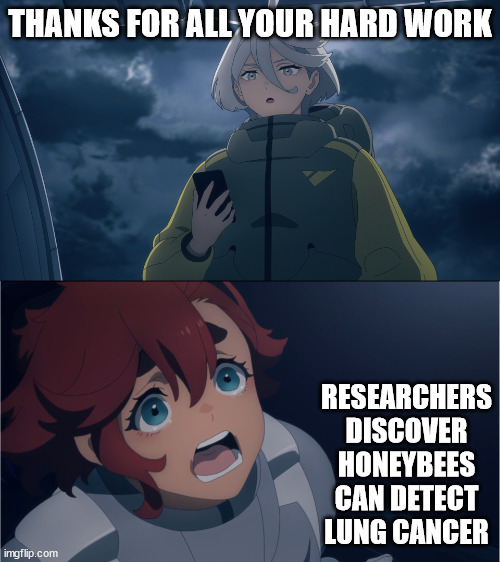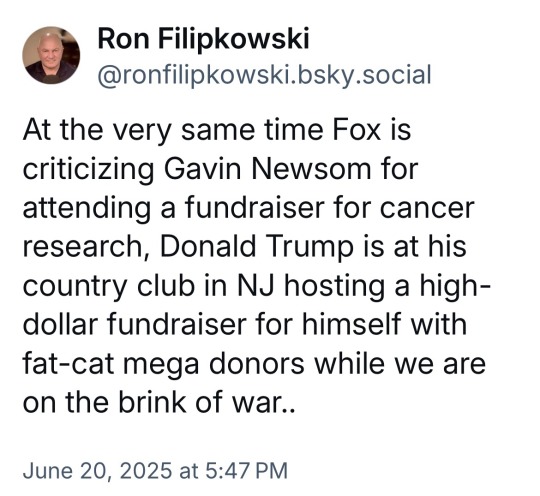#Cancer Research
Explore tagged Tumblr posts
Text

Republican war on women is very real.
Gutting research is pure evil. The misogyny within First Felon is pure poison.
10K notes
·
View notes
Text

#politics#political#us politics#donald trump#news#president trump#elon musk#american politics#jd vance#law#maga#childhood cancer#cancer research#nih#make america great again#america#us news
9K notes
·
View notes
Text
Trump may be about to sign the death sentence of the National Institute of Health, and, by extension, the Office of Lab Animal Welfare.
He gutted research animal protections.
Any vertebrate that isn't a mammal will have no rights.
Neither will mice or rats.
If NIH grants are stopped, researchers can't pay anyone. They can't perform research. They can't pay for veterinary services.
They won't be required to provide veterinary services.
The only medical research that will happen will be self funded by big pharma, and they can torture the animals and skew all the lab results that they want.
Just like Musk did to the primates in his neuralink research.
I don't know what's going to happen to me or anyone else at the university where I work. My job is to make sure the animals are treated humanely and to provide veterinary care. I'm especially scared about what's going to happen to those research animals if veterinary staff gets laid off. The USDA only covers mammals, and it doesn't even cover all of them. Every rat I've ever made a tiny paper gift box full of marshmallows for, every mouse I've ever watched grow up, every rodent I've ever separated from an aggressive dominant brother and then treated their tiny wounds, they have no protections if NIH goes down. Decades of research into humane handling, euthanasia, and animal behavior will be tossed aside and wasted.
Please, do everything you can. Protest. Contact your representatives. Anything you can do. Do it for science, for medicine, for people's lives, for people's jobs, and for the animals.
Edit: thank you to everyone who's spreading this, but please reblog the updated reblog that I have pinned to my profile. The NIH is no longer frozen, but "indirect expenses" limits is just as big a threat to lab animal welfare, scientific integrity, and people's jobs as an NIH freeze.
#nih#cdc#us politics#national institutes of health#research#department of health and human services#public health#donald trump#OLAW#office of lab animal welfare#usda#us department of agriculture#animal rights#animal care#animal health#science#cancer research#disease research#public health service#elon musk#presidential election of 2024#fuck elon#fuck trump#president trump#trump 2024#dump trump#infectious diseases#animal welfare#animal welfare regulations#mouseblr
1K notes
·
View notes
Text
"Doctors have begun trialling the world’s first mRNA lung cancer vaccine in patients, as experts hailed its “groundbreaking” potential to save thousands of lives.
Lung cancer is the world’s leading cause of cancer death, accounting for about 1.8m deaths every year. Survival rates in those with advanced forms of the disease, where tumours have spread, are particularly poor.
Now experts are testing a new jab that instructs the body to hunt down and kill cancer cells – then prevents them ever coming back. Known as BNT116 and made by BioNTech, the vaccine is designed to treat non-small cell lung cancer (NSCLC), the most common form of the disease.
The phase 1 clinical trial, the first human study of BNT116, has launched across 34 research sites in seven countries: the UK, US, Germany, Hungary, Poland, Spain and Turkey.
The UK has six sites, located in England and Wales, with the first UK patient to receive the vaccine having their initial dose on Tuesday [August 20, 2024].
Overall, about 130 patients – from early-stage before surgery or radiotherapy, to late-stage disease or recurrent cancer – will be enrolled to have the jab alongside immunotherapy. About 20 will be from the UK.
The jab uses messenger RNA (mRNA), similar to Covid-19 vaccines, and works by presenting the immune system with tumour markers from NSCLC to prime the body to fight cancer cells expressing these markers.
The aim is to strengthen a person’s immune response to cancer while leaving healthy cells untouched, unlike chemotherapy.
“We are now entering this very exciting new era of mRNA-based immunotherapy clinical trials to investigate the treatment of lung cancer,” said Prof Siow Ming Lee, a consultant medical oncologist at University College London hospitals NHS foundation trust (UCLH), which is leading the trial in the UK.
“It’s simple to deliver, and you can select specific antigens in the cancer cell, and then you target them. This technology is the next big phase of cancer treatment.”
Janusz Racz, 67, from London, was the first person to have the vaccine in the UK. He was diagnosed in May and soon after started chemotherapy and radiotherapy.
The scientist, who specialises in AI, said his profession inspired him to take part in the trial. “I am a scientist too, and I understand that the progress of science – especially in medicine – lies in people agreeing to be involved in such investigations,” he said...
“And also, I can be a part of the team that can provide proof of concept for this new methodology, and the faster it would be implemented across the world, more people will be saved.”
Racz received six consecutive injections five minutes apart over 30 minutes at the National Institute for Health Research UCLH Clinical Research Facility on Tuesday.
Each jab contained different RNA strands. He will get the vaccine every week for six consecutive weeks, and then every three weeks for 54 weeks.
Lee said: “We hope adding this additional treatment will stop the cancer coming back because a lot of time for lung cancer patients, even after surgery and radiation, it does come back.” ...
“We hope to go on to phase 2, phase 3, and then hope it becomes standard of care worldwide and saves lots of lung cancer patients.”
The Guardian revealed in May that thousands of patients in England were to be fast-tracked into groundbreaking trials of cancer vaccines in a revolutionary world-first NHS “matchmaking” scheme to save lives.
Under the scheme, patients who meet the eligibility criteria will gain access to clinical trials for the vaccines that experts say represent a new dawn in cancer treatment."
-via The Guardian, May 30, 2024
#cw cancer#cancer research#cancer#lung cancer#nhs#england#vaccine#cancer vaccines#public health#medical news#good news#hope
1K notes
·
View notes
Video
youtube
‘Who voted for this?’: Trump admin obstructs cancer research funding
"As of today, it looks as though Donald Trump is in the process of freezing federally-funded cancer research in the United States," says Chris Hayes.
330 notes
·
View notes
Text

238 notes
·
View notes
Text
Recent Trump administration cuts to university funding don’t just threaten the future of cancer care. They erode hope for every family facing a devastating diagnosis. It’s an auction of America’s future, with each university’s lifeline going once, going twice, gone.
$400 million slashed from Columbia University. $790 million from Northwestern. $1 billion from Cornell. $2.2 billion from Harvard. Each successive cut grows larger, as President Donald Trump, always trying to go big, aims for the world record for destruction of medical progress.
- -
It’s a race to the bottom.
146 notes
·
View notes
Text
The Walk Begins Again.

It's been a year since we lost our dear friend to appendix cancer, so we are once again hosting a walk on Primal: Levithan in his honor, starting on Saturday the 10th at 10:00AM CST from Proof in Urqopacha (the memorial site for the Yok Huy), going through Tuliyollal, Sharlayan, Limsa, Ul'dah, Gridania, and finally ending in our Free Company house (Empyreum ward 10, plot 42), where a memorial of him stands. Please join us in our walk, or simply donate if you can.
Thank you. <3

#ffxiv#lalafell#Forge ahead for Flynt#Flynt Khoal#Final Fantasy xiv online#ffxiv art#Cancer#cancer research#appendix cancer#ffxiv online#final fantasy xiv#ff14#final fantasy 14#had to edit the day in... almost forgot to mention.
60 notes
·
View notes
Text
#tiktok#fuck trump#us government#Harvard University#Harvard#university#science research#cancer research#donald trump#us politics#president trump#trump#trump administration#trump is the enemy of the people#trump's america#nih#national institutes of health#fuck donald trump#american cancer society#federal government#federal spending#research funding#trump is a threat to democracy#trump is a criminal
47 notes
·
View notes
Text


Republicans letting First Felon stop cancer research with zero pushback is disqualifying.
Forever disqualified. Forever unforgivable.
3K notes
·
View notes
Text
A federal judge on Wednesday blocked the Trump administration from drastically cutting medical research funding that many scientists say will endanger patients and cost jobs.
“The new National Institutes of Health policy would strip research groups of hundreds of millions of dollars to cover so-called indirect expenses of studying Alzheimer’s, cancer, heart disease and a host of other illnesses — anything from clinical trials of new treatments to basic lab research that is the foundation for discoveries.
Separate lawsuits filed by a group of 22 states plus organizations representing universities, hospitals and research institutions nationwide sued to stop the cuts, saying they would cause “irreparable harm.”
U.S. District Judge Angel Kelley in Boston had temporarily blocked the cuts last month. Wednesday, she filed a preliminary injunction that puts the cuts on hold for longer, while the suits proceed.”
#politics#political#us politics#donald trump#news#president trump#elon musk#american politics#jd vance#law#trump#trump administration#medicare#medicaid#healthcare#health#public health#health insurance#america#us#maga#trump policy#science#research#cancer#alzheimers#heart disease#cancer research
80 notes
·
View notes
Text

SOURCE
Honeybees can detect biomarkers of lung cancer in human breath, as discovered by Michigan State University researchers.
The bees can differentiate between different types of lung cancer cells based on smell, potentially aiding in early diagnosis.
Researchers plan to develop a noninvasive test using a sensor based on honeybee brains to analyze breath for cancer chemicals and report results wirelessly.
#sulemio news#sulemio#suletta mercury#miorine rembran#g-witch#g witch#us news#us medical news#honey bees#michigan state university#lung cancer#cancer#fuck cancer#cancer research
115 notes
·
View notes
Text

#like literally#us politics#usa politics#donald trump#usa#trump#usa is a terrorist state#elon musk#fuck trump#elongated muskrat#cancer research
27 notes
·
View notes
Text

At the very same time Fox is criticizing Gavin Newsom for attending a fundraiser for cancer research, Donald Trump is at his country club in NJ hosting a high-dollar fundraiser for himself with fat-cat mega donors while we are on the brink of war..
#fox news#california#democratic governor#gavin newsom#fundraiser#cancer research#donald trump#new jersey#country club
115 notes
·
View notes
Text



#princess of wales#catherine princess of wales#catherine middleton#kate middleton#british royal family#royal marsden hospital#kensington palace#cancer diagnosis#cancer treatment#cancer research#chemotherapy#remission#cancer journey#cancer#specialist cancer hospital#patients#hospital staff
22 notes
·
View notes
Text

I've finished all the charts, and now I'm sure it will be smooth sailing, as the sock is knit entirely in stockinette in a single color. It's looking lumpy right now, but I'm hoping that that will settle down once it's blocked. Yes, I block my socks!
#knitting#yarn#creative#pattern#handmade#crafts#sock#knits#hand knitted#knit#knitblr#knitters of tumblr#knitting pattern#knitwear#lace knitting#lace motif#colorwork#ravelry#52 weeks of socks#sock knitting#handmade socks#cancer#cancer research#leukemia#lymphoma#fundraiser#fund raising#verified fundraiser#go fund me#gofundme
11 notes
·
View notes